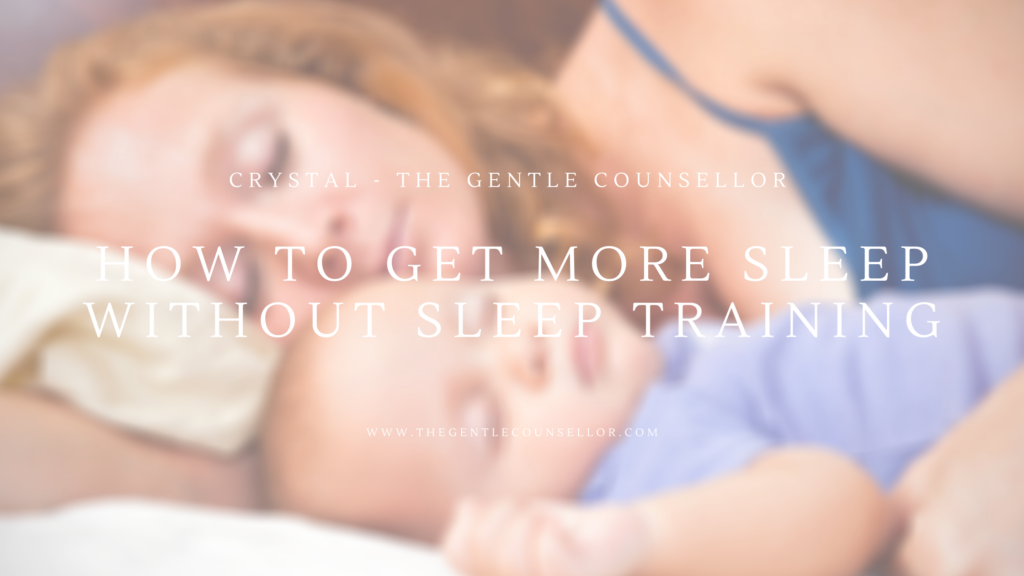
Do people constantly ask you if your baby is sleeping through the night?
Are you struggling to get more sleep?
Does leaving your child to cry not sit well with you?
Congratulations, you’re normal!
Ok, all jokes aside sleep deprivation is hard and it is probably the number one concern that all parents experience. However, the problem is not your baby.
Sleep is developmental and our children are designed to wake for a variety of reasons such as being a protective factor against SIDS (what once was called cot death fyi).
Most recommendations are for babies to share a sleep space with us for the first 6 to 12 months and this can be through cosleeping where the cot is in the room, side-car cot, or safe bedsharing (Read more).
It is important to be near our children so we can respond to their needs especially for the first 12 months of their lives. During this time they are still learning about object permanence and essentially believe we are one person. When they cannot see, smell or touch you this sets of their fight/flight response because they believe we have disappeared, and then our babies communicate their fear to us through crying.
This is a natural and biological response that is built-in to them.
Parenting is a 24/7 gig, but of course, I am sympathetic to those of us with sleepless nights. Trust me, I am in the trenches with you here.
When we are pregnant, people tell us ‘get your sleep now!’ and then that changes the moment we give birth to ‘is the baby sleeping through yet?’ and we are made to feel like we have done something wrong. You have not done anything wrong. We all know that they wake, that is why people warned us!
How To Get More Sleep
We do not need to sacrifice our child’s wellbeing. There are ways that families can get more sleep and it is important to drown out the ‘noise’. Our instincts as parents are so strong, and our children tell us exactly what they need.
- Understand that night-waking is normal and age-appropriate for their development. Sure, some unicorn babies exist but many of us experience night-waking.
- Accept that this will happen for the first 3-5 years. The more you meet your child’s needs and set them up to feel safe and secure, the more likely you are to get more sleep and have better sleep in the long term.
- Find ways to embrace it i.e changing your mindset to enjoy more cuddle time. Some put their mattress on the floor and embrace the family bed, some take turns each night who bedshares whilst the other gets a full night sleep, some bedshare and breastsleep (Read more on how to safely bedshare).
- Understand that they all get there when they are ready. One day (that does come sooner rather than later) they will prefer to sleep in their own room, they will not wake at night, and you’ll find yourself waking them up in the morning to start the day.
- If it ain’t broke, don’t change it. If your child falls asleep at the breast, with songs, with cuddles, with rocking, then keep doing what works. We become more frustrated when we try to make changes that just do not suit us or our child.
As adults we share a bed with our partner.
As adults we wake to use the toilet or have a quick drink.
As adults we wake briefly, then fall back asleep – because we are developmentally capable of this!
Can you tell this is something I am really passionate about?
It is because I was there. I went through all the sleep ‘regressions’ or progressions as some prefer to call it which is a much better mindset. I had everyone around me pressuring me to do something that I was not comfortable with. Now I openly talk about this because a lot of us stay silent in our struggles.
I know it’s hard. I know it feels like this will go on forever. I know you wish your child was a unicorn. It is ok to be annoyed and frustrated about it. You will sleep again. It doesn’t feel like it now, but you will. You do not have to sacrifice yours or your child’s wellbeing.
Here are links to some of my favourite sleep resources:
Evolutionary Parenting has a screening tool that looks at common behaviours and sees if it fits with certain outcomes that may explain sleep troubles in young children. Click here.
The Beyond Sleep Training Project
The No-Cry Sleep Solution by Elizabeth Pantley